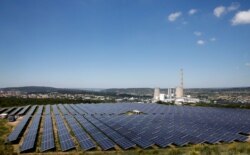How politically realistic are the climate action goals that European governments are setting in lockstep with the United States?
Some analysts are warning that the rich can afford the necessary changes, but the burdensome costs of a green transition for middle-class and poorer voters could trigger a backlash and prompt electoral reversals.
Others worry European governments have still not fleshed out in practical terms how to meet their ambitious climate action and emissions reduction goals and that a failure to deliver solutions, as happened after the 2009 United Nations Climate Change Conference, risks undermining an emerging public consensus about the danger of climate change and a recognition action is required.
“If you create a deadline that is unrealistic, which we will not be able to actually achieve, you put it completely beyond the bounds of possibility — that doesn’t mean you can’t have a high bar, you should be aiming for a high bar — but it can’t be unrealistic,” Jamie Clarke, executive director of the British charity Climate Outreach, cautioned British lawmakers recently.
Previous climate conferences have been followed by plummeting public interest in the environment after political leaders failed to live up to the expectations they set, he told a parliamentary panel.
Clarke was testifying in the wake of last month’s U.S.-hosted virtual two-day climate change summit, which coincided with Earth Day. Dozens of leaders reiterated their pledges to tackle climate change, including China, which said it would phase out coal-powered electricity generation starting in 2025. President Joe Biden promised to cut U.S. emissions in half by the end of the decade.
Britain’s Boris Johnson said his country planned to achieve a 78 percent reduction in carbon emissions by 2035, compared with 1990 levels, the most ambitious climate target announced by any country in the world.
More spending on renewable energy
Biden focused his comments on the contribution that innovation can make to help countries meet their climate goals. He announced the United States would revive participation in an initiative among dozens of nations and investors to increase spending on renewable energy research, development and deployment.
Biden acknowledged that the challenges of reducing planet-warming emissions would be met by “working people” but emphasized that as the world transitions to clean energy, “we must ensure workers who have thrived in yesterday’s and today’s industries have as bright a tomorrow in the new industries as well as in the places where they live.”
Biden has been stressing the potential energy transition has to create new jobs.
And experts say there has been an extraordinary reduction in the likely costs of tackling climate change. “Climate action is becoming more affordable across the board,” according to Gernot Wagner, a professor at New York University and co-author of the book “Climate Shock.”
In a commentary this week for Project Syndicate, an online platform of opinion, Wagner says climate action is becoming less expensive. He cites solar panels. “The costs of solar photovoltaic [PV) panels have plummeted by over 85 percent in under a decade, and by well over 99 percent since the first panels found their way onto people’s roofs in the early 1980s,” he says.
Climate action and political dilemma
Nonetheless, for Western governments climate action poses a massive political dilemma.
If they impose green tax hikes and the costly measures on transportation, home heating, power generation and lifestyles that scientists say are needed to lower emissions and to shift economies away from dependency on fossil fuels, governments risk prompting a backlash, largely from middle-class and lower-income workers, as well as pensioners who can ill afford to bear the expense.
But if governments move too slowly, they risk strong reaction from climate activists and their supporters, who are often affluent.
Reconciling those who demand fast-track climate-friendly measures and those who want to move slowly isn’t going to be easy — as France’s Yellow Vest protests in 2018 and 2019 made abundantly clear, say analysts.
The European Union is negotiating on how to translate its planned 55 percent reduction in greenhouses gases into legislation that will work for all 27 member states, all of which have different economic and domestic political interests and different levels of energy development.
European trade unions have welcomed EU climate goals but they warn that climate-action measures need to be implemented alongside an equally ambitious social transition plan to mitigate costs for ordinary families, according to Judith Kirton-Darling, deputy general secretary of IndustriALL Europe, an international trade union federation.
Costly green transition
The likely cost to living standards is undeniable. In Britain commentators are questioning how the government will transition towards climate-friendly home heating.
Nearly a third of Britain’s greenhouse gas emissions is produced by residential central heating and Johnson’s government has announced plans to phase out the sale of natural gas boilers for newly-built homes by 2025 and for all homes by the mid-2030s.
Eighty-five percent of British homes are heated by natural gas, which produced greenhouse cases, and transitioning to hydrogen boilers or more likely electric heat pumps will be costly. A natural gas fired home furnace costs around $1,400 but heat pumps are far more expensive, costing over $20,000. Who will bear the cost — the consumer or the government?
Action on climate change involves “policies that will hit people in the pocket,” says economics commentator Jeremy Warner, a columnist for Britain’s Daily Telegraph. Tough choices loom, he says, and there will be costs to people’s pockets, and costs to established livelihoods made obsolete by the transition from one age to the next.
“In their newfound enthusiasm for all things green, the politicians would be wise to bear this in mind and design mitigating policies accordingly,” he adds.






